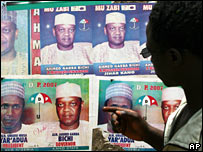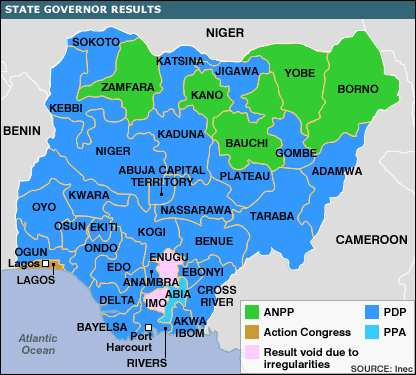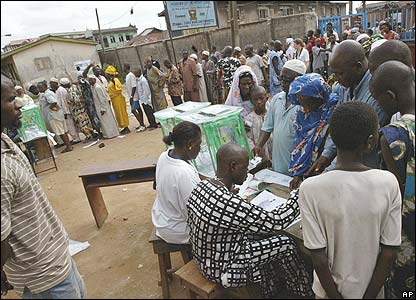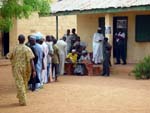 |
| Nigeria Presidential Election 2007 (Picture from BBC News) |
PUBLIC PARTICIPATION
MONITORING ELECTION WITH MOBILE PHONES
Introduction
This project was implemented during Nigeria’s 2007 Presidential Election and was led by the Human Emancipation Lead Project Foundation. This study shows how civilians were encouraged to participate in the monitoring of their own polling areas during the election. This activity complemented the monitoring operations carried out by international observers headed by the
European Union (EU).
Background
The Nigerian Presidential Election on April 21, 2007 was a historic event, the first time since Nigeria's independence in 1960 that power was transferred from one civilian President to another. Outgoing President Olusegun Obasanjo wanted the election to be fair and legal, and called on election officials to prevent rigging. To ensure a fair election process, EU observers were brought in to monitor the event. However, the effectiveness of foreign observers was limited by the number of polling stations they could visit on the Election Day. Areas known for their violence and kidnappings were avoided, which presented a handicap for the foreign election monitoring process. The international observers’ inability to cover the entire country left a vacuum that permitted vulnerabilities and mismanagement in the election process to go undetected. In addition, foreign observers were easily recognized by their appearance. They wore specially printed clothing to signify their positions, in the interest of security as well as to allow them special access to restricted areas. Because they were so easily recognizable, unfair practices or fraud could be easily concealed from them. In this project, cellphone technology was used to facilitate surveillance activities by the civilians, and citizens were empowered to report abuses of the electoral process.
Read about Nigeria Country Profile
Here
 |
| Map of Nigeria |
The public monitoring effort was organized by a local non-governmental organization, the Human Emancipation Lead Project (HELP) Foundation, with the assistance of another NGO, the Professionals for Humanity (PROFOH). The project, called the Network of Mobile Election Monitors, or NMEM, was fully supported by an organization called
kiwanja.net; that served as the backbone for the funding and technology used in the project.
NMEM developed the idea of using mobile phones technology to monitor the election. In this project, ordinary Nigerians were called to participate in monitoring and reporting on the voting process in their own area on the Election Day. The project was established independent of the EU, and was made possible by the existence of 30 million mobile phone subscribers nationwide. NMEM believes that encouraging ordinary citizens to observe and report on the elections would yield accurate and impartial information on their conduct, because ultimately it is the public that must validate the credibility and legitimacy of the eventual outcome.
 Technology
Technology
The integral part of this project is a technology called FrontlineSMS, developed by kiwanja.net. A Short Message System (SMS) Hub was set up to keep track of all text messages delivered by participants. In mobilizing the project, NMEM started by establishing associate residents in every state in the country, who were then trained to recruit volunteers from their own areas. These volunteers would then forward NMEM’s invitation SMS to as many people in order to create a nationwide distribution. FrontlineSMS system allows mass-messaging to mobile phones and for recipients to respond to a central computer.
During the election, volunteers fed their observations back to the computer hub. The controller of the project would then verify the authenticity of the reporting by cross-referencing it with other participating members in the areas concerned. (Such operations were made possible by the dedicated software.) Verified messages would then be shared with the international observers.

Results
According NMEM, over 10,000 messages were received into the SMS hub. The Nigerian citizens’ reporting indicated cases of extensive fraud and rigging perpetrated by the participating political parties in their areas of control. The FrontlineSMS system was also used to survey opinions from registered volunteers regarding the outcome of the election, which resulted in the appointment of Mr. Umaru Yar’ Adua as Nigeria’s new President. Based on their survey, it was discovered that about a fifth of NMEM’s respondents wanted the results to be cancelled, while the majority believed that Nigeria could not afford the cancellation and rescheduling of the election. NMEM also faced limitations due to insufficient funding that left them to do most of their monitoring at the polling stations,not at the collation centers. The NMEM's report's concluded:
“Our report indicates fraud and other irregularities in the elections, and this has been collaborated by report of foreign and other domestic observers. However, there were pockets of hope in places where elections where orderly, free and fairly conducted as earlier mentioned in this report. These area needs to be commended for their vigilance and commitment to their civic responsibilities. We however believe that the wish of the people was honoured and the most popular candidate returned. Though the election was flawed, many Nigerians shared their views with us, and we believe that this practice will greatly assist in determining the legitimacy of this and future elections in this country. We are very happy we helped give the people a voice via text messaging.“
The NMEM electoral project demonstrates how mobile phone technology can be used to engage the public in playing a role to prevent electoral fraud. Although the
BBC covered the initiative, there was no formal and independent monitoring and evaluation of the effectiveness of the project.
The Al Jazeera news report on Nigerian 2007 Presidential Election is available
here.
kiwanja.net, with its key focus on developing countries, has been helping local, national and international non-profit organizations make better use of information and communications technology in their activities. It specializes in the application of mobile technology and provides a wide range of ICT-related services to non-profit agencies and actively seeks to provide the tools and the environment to enable them to do so. kiwanja.net provides free consultancy, workshops and advice and access to the technology it developed to all grassroots non-profits interested in exploring the social and environmental potential of mobile in their work. Kiwanja.net funds itself through delivering various consultancy services (talks, conferences, workshops) as well through fundraising (organized by its affiliate Kiwanja Foundation). Kiwanja.net also run researches and project through collaboration with Universities, United Nations agencies and multinational corporations. For further information visit
www.kiwanja.net.





